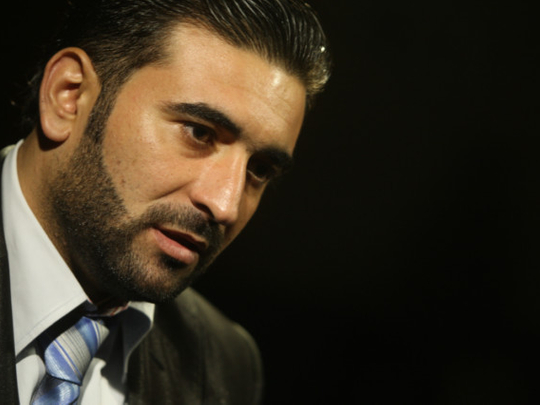
Dubai: Born and raised in the Shujayia refugee camp in Gaza, 28-year-old Mohammad Al Qassas lost 14 members of his extended family in the latest Israeli assault on Gaza. But the tragedy that befell him is not something unfamiliar to the young man.
In an interview with Gulf News, Mohammad shares his story of what life was like growing up in Gaza and his relentless quest to secure a decent future.
Watch a video of the interview below
At the tender age of 13, Mohammad began working to help support his parents, two brothers and three sisters. His father had been crippled after an Israeli bullet damaged his spinal cord during the first intifada.
To make up for his father’s disability, Mohammad worked selling fruits and vegetables while going to school at the same time. Mohammad couldn’t recall any good memories from his childhood. “Many people I knew were killed or arrested by Israel,” he said.
Despite the challenges of working and attending school, Mohammad managed to finish secondary school. The question then was what’s next.
His family had no money for university so young Mohammad was determined to look for a scholarship to further his education. “When I was young I had a dream to be a pilot,” he said. His voice then trailed off. “The Israeli occupation killed my dream, just like it has killed the dreams of many Palestinians.”
One day he received some unusually good news. He had been awarded a scholarship by His Highness Shaikh Mohammad Bin Rashid Al Maktoum, Vice-President and Prime Minister of the UAE and Ruler of Dubai, to study at the Dubai Police Academy.
However, the only way out of Gaza was through its border crossing with Egypt since Gaza’s only other border is with Israel. An Israeli-imposed siege on Gaza since 2007 has made the small enclave an open air prison for its 1.8 million residents. The Rafah border with Egypt was sealed and Mohammad could not leave. He pushed his dream aside and resigned himself to the reality of life in Gaza. Two years later, some of the border restrictions were loosened and he finally was able to travel.
The journey to the UAE from Gaza took 45 days because Mohammad was required to obtain Israeli permits which require lots of paperwork.
However, the impossible happened — he finally made it out.
Mohammad’s weary face beams with excitement as he recalls his four years at the academy. “It was the first time I saw a society full of different nationalities. I saw a life of peace and happiness.” He was in awe of everything he saw in Dubai, which was a far cry from life in Gaza.
“I read a lot about Shaikh Mohammad’s life and how he developed a vision for his country. He inspired me and shaped my personality.”
He graduated with a degree in law and police enforcement with honours and for the first time he was hopeful for his future. Citing one of his favourite quotes from Shaikh Mohammad, he said, “Time is short and I am in a hurry.”
But his optimism was short-lived. When he returned home in 2009, Gaza was recovering from a devastating Israeli assault dubbed ‘Operation Cast Lead’ which killed over 1,400 Palestinians and caused massive destruction.
“I left a place that was already bleeding and when I returned I found the wound had gotten even worse,” he said.
“I went into severe depression. Here I had received a degree from a reputable university, and came back to Gaza and couldn’t even afford to buy medication for my family.”
Many of his childhood friends and relatives were injured in the assault and Gaza’s main power plant was destroyed. “I arrived at night in total darkness. I had to light candles just to see the faces of my family members.”
The next step for Mohammad was to try to find work in Jordan. He secured a one-month visit visa, but wasn’t granted a work visa due to his nationality as a Palestinian from Gaza. “I was crying on the inside. I wished my birth certificate only said that I am human and not Palestinian,” he said.
He flew back to Egypt but again the Rafah border was closed so Egypt wasn’t granting the typical three-day transit visa for Palestinians travelling back to Gaza. With nowhere to go he flew back to Jordan where he was forced to pay heavy fines for overstaying his previous visit visa. He exhausted all possible options in Jordan, but he wasn’t granted a visa and no other embassy he reached out to was able to help him. He was at the end of his rope.
“At that point I decided that I had to come to Dubai by any means necessary.” He used the last bit of money he had to buy a ticket to Malaysia with a transit in Dubai. For 20 days he was stranded at the airport, making phone calls to anyone that could help him out. Finally, he was able to obtain a visit visa with a friend’s help.
Mohammad’s future in the UAE is uncertain. He doesn’t know what tomorrow holds or where he will end up. “It’s ironic that I have a degree in law and have studied human rights but I haven’t found my own human rights,” he said.
His case is not dissimilar to the struggles many Palestinians face both inside Palestine living under Israeli occupation and outside Palestine as refugees trying to make it. Mohammad hopes his story will highlight the monumental challenges Palestinians face in their quest for dignity.












